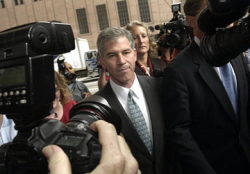Mark:
Making a documentary about the rise and fall of a trading company that dealt in imaginary numbers, (pretty much my understanding of the stock markets), risks being incredibly dull and uninspiring, and yet it also gives the filmmakers a great opportunity – make it interesting and alive, and you have a major achievement on your hands. That Enron: The Smartest Guys in the Room not only kept me awake, but filled me with horror, is a wonderful endorsement.
In the 1990’s the gradual and then meteoric rise of the internet provided a fertile ground for shysters and conmen, and those who ran Enron seem to have been the best of the bunch. Confident, manipulative, cunning and intelligent, these men milked billions from the trading of energy – oil, natural gas, electricity, even internet bandwidth – and fooled everyone around them while doing it. The final truth, that their business was sinking faster than the Titanic (an oft-used metaphor in this documentary), came as a shock to their investors and the greater stock trading and banking community of North America. The argument of this film is that the signs were all there, and that through a mixture of bravado and illegal deception, those who should have known it was coming conned others into not seeing it.
 The most horrific of these deceptions was the manipulation of the Californian electricity network to enable ever-higher profits. Featuring audio recordings of calls made by Enron traders to engineers, requesting they shut down their plants for six hours or so – ‘get creative’ – which will drive the price of electricity in the world’s sixth largest economy even higher, we are shown that not only was this crisis avoidable, but how low one company can go when their staff are encouraged to do anything to make more money. That the Californian Energy Crisis of 2000/2001 may have lead to deaths amongst residents of that state makes this greed beyond all moral ethic even more despicable.
The most horrific of these deceptions was the manipulation of the Californian electricity network to enable ever-higher profits. Featuring audio recordings of calls made by Enron traders to engineers, requesting they shut down their plants for six hours or so – ‘get creative’ – which will drive the price of electricity in the world’s sixth largest economy even higher, we are shown that not only was this crisis avoidable, but how low one company can go when their staff are encouraged to do anything to make more money. That the Californian Energy Crisis of 2000/2001 may have lead to deaths amongst residents of that state makes this greed beyond all moral ethic even more despicable.
The culture within Enron seems to have been that the stock price was all-important, and therefore anything that could be done to increase it was ok. Their meteoric rise on the back of the internet boom took their value to around $130 per share, and they were worth over $60 billion. In the few months when this all came crashing down, they rapidly fell to being worth only cents per share, but the worst of this is that the average investor had their accounts frozen in an attempt to halt the sell-off, meaning they couldn’t save their retirement nest-eggs, whilst the bosses sold off their millions in stock and ended up secure.
By mixing interviews with Bethany McLean – the first analyst to write articles questioning Enron’s deceptive accounting practices, and the author of the book and this film – as well as former traders from Enron and other trading houses, we gradually build up a picture of the corporate culture that allowed such a disaster to occur. We are given flow charts to help us understand the use of small companies to defray losses, we see footage from Enron motivational videos that show company heads joking about some of these deceptions, and we hear from one of the inner circle what truly happened, and her observations of what those in charge really were up to. The juggling of all the various resources to present a cohesive narrative is standard documentary fare, but it is done superbly in this case.
There are times when this documentary truly shines – the sequence that demonstrates the manipulation of the ‘Californian Energy Crisis’ by Enron traders is the best example – but it is only on reflection that its true worth is recognised. For not only did I remain interested, I understood all the evidence provided me, and my instruction had been carefully judged to provide it with the biggest impact. These guys were the worst of the worst, and they hired and developed the biggest bullies on the block. Their success and then failure lead to the ousting of the Californian Governor, the destruction of Arthur Andersen accounting firm, and their contributions helped George W. Bush gain power in 2000. The biggest impact of all – on the little guys who lost everything – will be felt for decades.
Rating: